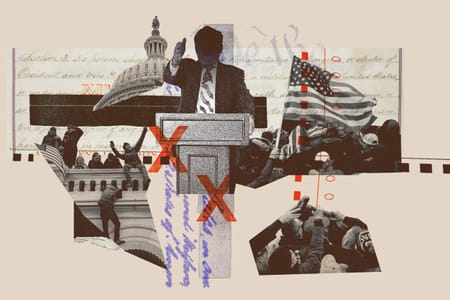The Constitution’s Disqualification Clause Can Be Enforced Today

What’s next for 14.3?

Delivered to our subscribers on Thursdays, the new version of The Bridge is an email exclusive product that wades through the jargon of our government and gets straight to the key insights. Sign up here.
The question of the applicability of Section 3 of the Fourteenth Amendment — also known as the disqualification clause — was first raised shortly after the attack on the Capitol on January 6, 2021. Under the disqualification clause, any elected official who had sworn to uphold the Constitution and then engaged in insurrection against the government could not hold office again. And though historians, scholars, and experts across the ideological spectrum (and even Congress’s bipartisan January 6 Committee) have vouched for its use to hold Trump accountable for his engagement in January 6, the question hasn’t been answered by the nine justices of the Supreme Court, whose opinion on the matter will be the most decisive. Last Thursday, the question was finally brought before the Supreme Court through the historic case of Trump v. Anderson. The justices’ ruling, once it’s issued, will be hugely consequential to this year’s election and the former president’s political future.
For today’s edition of The Bridge, I talked with one of our resident Constitution experts, Senior Policy Analyst David Janovsky, and asked him to answer two simple questions.
In this edition:
With Trump v. Anderson, the justices are considering whether Trump engaging in the January 6 insurrection disqualifies him from appearing on Colorado’s state ballots, as the state’s supreme court ruled in December 2023. If the federal Supreme Court upholds the state court’s decision, it will have enormous consequences: Trump could be barred from every state ballot across the country.
“The core question at the center of this case is, ‘Did Trump engage in an insurrection?’ The longer we go without a definitive answer to that question, the more difficult it is to move forward,” David told me.
But that has become one of the biggest criticisms of the justices coming out of last week’s hearing — how little interest they showed in answering, or even considering, that question at all. Instead, the justices spent a significant portion of time discussing definitions of the word “officer” and what it means to “hold” office versus to “run” for office, and how those words could alter the applicability of the disqualification clause to this case.
”The justices spent approximately no time discussing what the meaning of ‘insurrection’ is,” David said. “You could look at that optimistically and say, ‘Maybe because it’s so glaringly obvious that this was in fact an insurrection and Trump did engage in it, we don’t need to spend time clarifying those things.’”
But David said he was disappointed to see the justices dance around the seriousness of allowing a candidate who has been found to have engaged in an insurrection to remain on the presidential ballot.
“What makes the justices’ approach jarring is that the root of this case is that a former president, plausibly and in the ruling of a state supreme court, actually engaged in an insurrection that was designed to prevent the lawful transfer of power,” David said. “And there was very little in the oral argument that would give a sense of just how consequential that is. This is not a run-of-the-mill ballot dispute. This is a big deal. When we talk about the disqualification clause, we’re talking about the Constitution’s self-defense mechanism. I would have expected the Supreme Court of the United States to acknowledge that in some way, and it didn’t really feel like that happened.”
As David explained to me, judicial minimalism is sometimes considered a virtue. The justices’ focus on the seemingly small picture — on the technicalities — could be because they’re intent on resolving the case on narrow grounds instead of making broad, sweeping judgments.
“But there’s no way to resolve this case that doesn’t have absolutely monumental consequences, no matter which way they rule,” David said. “Even a technical, narrow ruling is earth-shakingly consequential here.”
The Supreme Court was quick to set a date for oral arguments on Trump v. Anderson; with Colorado state primaries right around the corner, the case is as urgent as can be. “And because they took this case on an expedited basis, I think we can expect a ruling in the next month,” David told me.
As we noted in the Weekly Spotlight over the weekend, it’s always hard to predict an outcome from oral arguments alone.
“The justices could rule that states can’t enforce the disqualification clause at the primary stage, that they have to wait until later. They could rule that states don’t have the power to enforce disqualification at all. Or they could rule that Congress would need to pass a law around the disqualification clause before it can be enforced,” David listed. Those are just a few scenarios, and each would have its own consequences.
“But if the Supreme Court doesn’t resolve the question of whether Trump is disqualified for his involvement in the attack on the Capitol, we will have to consider who is left as a decision-maker to enforce the disqualification clause,” David told me.
We’ll have to wait and see how the court rules. For now, we’re staying optimistic and adamant in our belief that Trump’s actions disqualified him from holding office in the future, and we’re holding out hope that the justices will agree. You’ll hear more from us as things unfold.



Sent Saturdays
